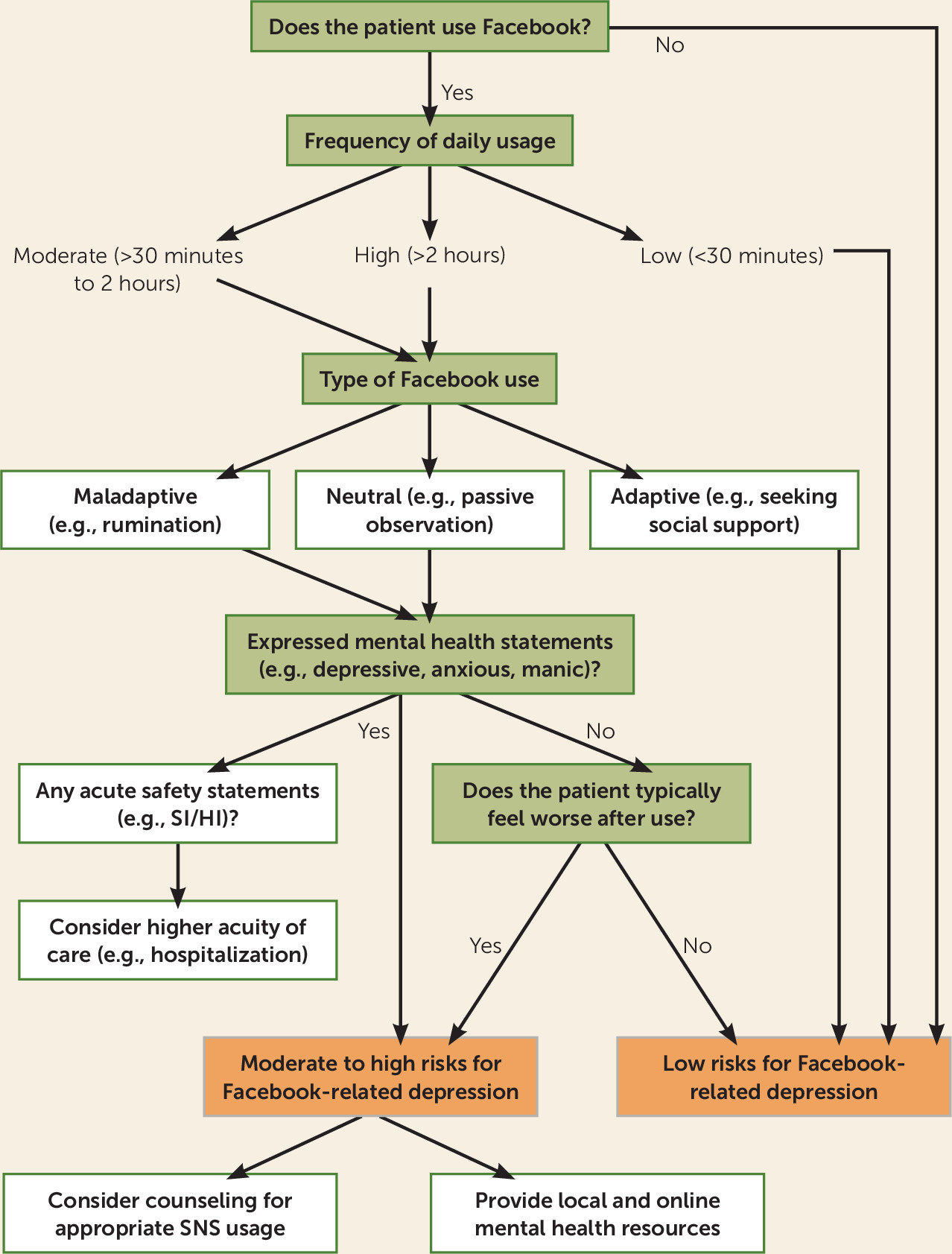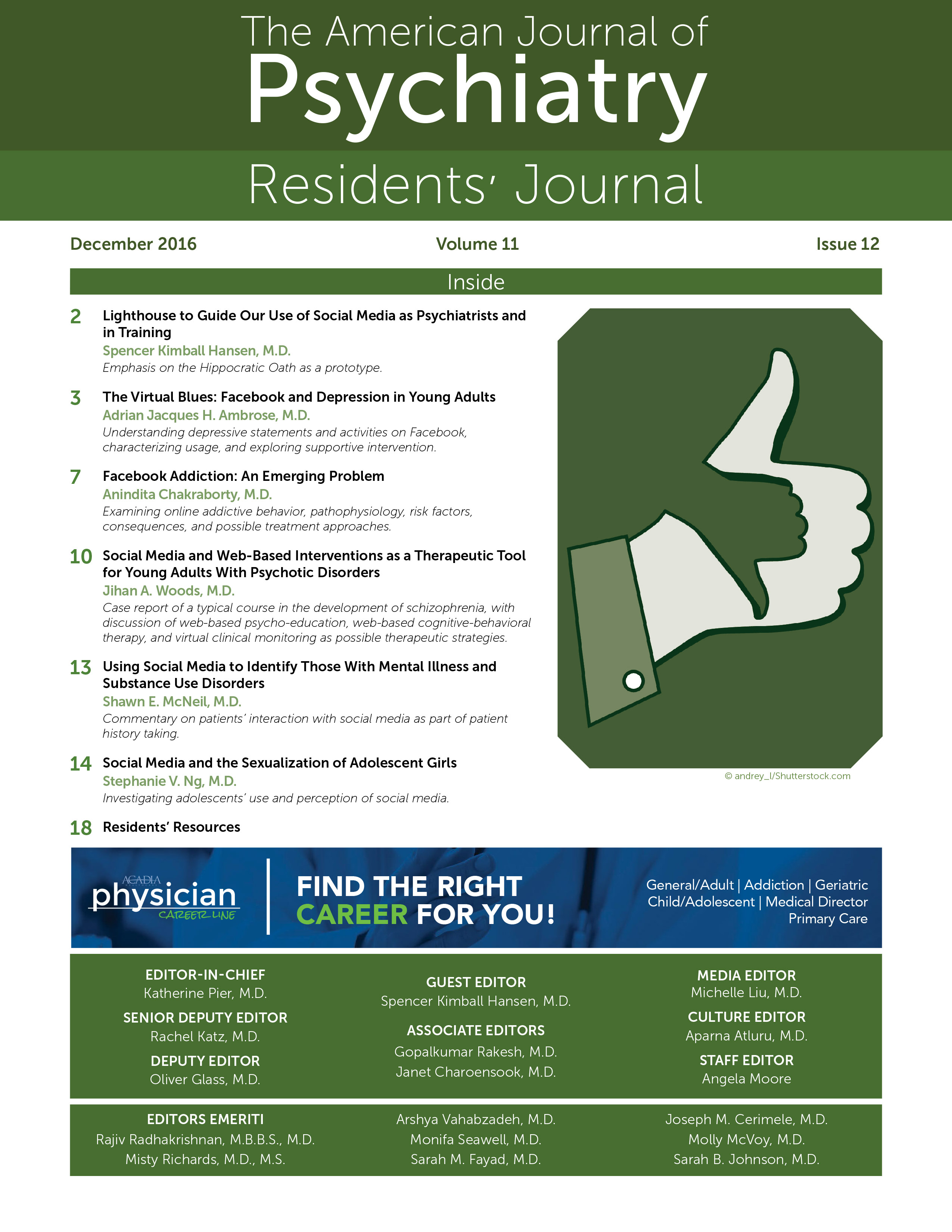Social networking sites, which virtually connect individuals for social, personal, and professional reasons, are ubiquitous among online users, especially in the young adult population. The Pew Research Center estimated that approximately 87% of online young adults, aged 18–29, are Facebook users (
1); similarly, approximately 90% of college students reported using Facebook (
2,
3). Using its online social media platform, Facebook users share their demographic information and activities and interact with other “friends” (i.e., other Facebook users), who are often family members, friends, or co-workers. The high prevalence of young adult users has raised questions about Facebook’s effects on their mental health.
Nationally, major depressive disorder remains one of the most common mental illnesses, with an estimated lifetime prevalence of 16.2% among U.S. adults (
4). According to a recent epidemiological report by the Substance Abuse and Mental Health Services Administration (SAMHSA), 6.6% of U.S. adults experienced at least one major depressive episode in 2014; however, when stratified by age, the young adult group, aged 18–25, had the highest prevalence of major depressive episode (9.3%) among all adults (
5). In the young adult population, the relationship between Facebook, the most popular social networking site in the United States, and depression, the most common mental illness, remained unclear. Some studies have suggested a positive correlation between Facebook use and depression (
2,
6–
9); however, others have found no association (
10,
11). The present article aims to review the current literature about Facebook and depression and offer a general framework for clinicians to approach Facebook usage among young adults.
Method
The review articles were obtained from a comprehensive search using PubMed, Medline, and Google Scholar via the MeSH [medical subject headings] terms “young adults,” “internet,” “social media,” “depressive disorder/depression,” in combination with the keywords “Facebook,” “depression,” “young adult,” and “adolescent.” Pre-established selection criteria for reviewed papers were peer-reviewed, available full-text in English, and used Facebook as one of the primary research variables. Given the focus of isolating the effects of Facebook, articles discussing global social network in general terms were excluded. Protocol articles were also excluded.
Results
Understanding Depressive Statements and Activities on Facebook
It can be difficult to ascertain whether depressive statements on Facebook indicate an ephemeral mood or, rather, a chronic state of clinically significant depression. Applying DSM-IV criteria, Moreno et al. (
9) found that 25% of Facebook profiles made one or more depressive symptom references, and 2.5% made statements that met full criteria for major depressive disorder. In this cross-sectional study, the size of the user’s Facebook network (e.g., the number of Facebook friends) was not correlated with depressive symptom references.
The Facebook activities of a user may reveal major depressive disorder symptoms or prodromal depressive states (
2,
6,
10–
12). In a cross-sectional study, Moreno et al. (
2) demonstrated an association between depressive symptom references on users’ Facebook profiles and their Patient Health Questionnaire (PHQ-9) scores. Through self-reported scales, such as the Center for Epidemiologic Studies Depression (CES-D) and Beck Depression Inventory (BDI), users in a cross-sectional study with more depressive symptoms seemed to access more health information and tips related to depression (
6). Additionally, users with more depressive symptoms appeared to use less Facebook features (e.g., messaging others, updating statuses, and commenting).
Characterizing Facebook Usage
Davila et al. (
13) suggested that the nature of the social networking site activities mattered more than the frequency of usage. The negative quality of the Facebook activities (e.g., experiences of rejection, conflict, or exclusion) was associated with depressive symptoms over time; however, the act of using Facebook by itself was not correlated with depressive symptoms, as measured by BDI. It is noteworthy, however, that this cohort study examined Facebook usage as an aggregate with other social networking sites, such as MySpace. Along the same vein, the type of Facebook usage may affect the user’s mental health in real-time (
14). In a mixed descriptive study, the user’s Facebook activities were codified as adaptive (e.g., seeking social support, receiving validation/positive feedbacks), maladaptive (e.g., rumination), or neutral (e.g., passive observation, changing profile pictures), depending on how their Facebook use correlated with their mood at the moment. Although a user’s mood was found to worsen with maladaptive activities, it is unclear whether a user with a preceding negative mood (e.g., a depressed user) would be more likely to conduct maladaptive activities.
Facebook Use, Addiction, and Intrusion: Indirect Factors in Depression
Facebook users who spend more time on Facebook may be at risk for Facebook intrusion, defined as, “excessive involvement in Facebook, disrupting day-to-day activities and interpersonal relationships” (
15). Błachnio et al. (
15) found positive correlations between total time spent on Facebook and Facebook intrusion and between Facebook intrusion and depressive symptoms, as measured by CES-D (
15). However, there was no statistical significance between total time spent and depressive symptoms. In line with this, Chen et al. (
16) found a similar indirect effect between Facebook interactions and psychological distress and self-esteem secondary to communication overload. Both studies were cross-sectional.
In a cohort study, Kross et al. (
17) found that Facebook usage led to a decline in self-reported life satisfaction. The users’ pre-existing moods did not affect the frequency of Facebook use. However, Koc et al. (
8) found that college students with anxious or depressive symptoms were more likely to use Facebook excessively. In this cross-sectional study, users with excessive Facebook usage were more likely to report mood alterations and negative academic outcomes. Users with Facebook addiction were also found to have an increased risk of depressive, anxious, and somatic symptoms (
7).
Facebook as a Call for Help
Online support interventions may be a possible route of interventions for users with concerning mental health status updates on Facebook (
18). In a July 2016 Washington Post story (
19), the author described how she contacted Facebook for guidance on what to do when encountering troubling status posts. A company representative referred her to Facebook’s mental health initiative that allows family and friends to tag troubling posts, at which time teams around the world review the posts—prioritizing the most serious, like those threatening self-injury—and send help to the distressed party such as contact information for suicide hotlines or other suggestions for coping with difficult situations. In focus group discussions, college students have reported a general willingness to reach out to close friends or family members who post alarming mental status updates, such as depressive or suicidal statements. In a cross-sectional study, Whitehill et al. (
20) found that one-third of participants’ Facebook profiles had depressive symptom references (e.g., “I feel hopeless,” “I feel like giving up”), as coded using DSM-IV; however, 44% of female users mentioned depressive symptoms compared with 17% of male users. All participants expressed hope of intervention on their behalf if they were to display depressive symptoms online. Student advisors and college health staffs may be able to utilize Facebook as an additional platform to encourage treatments and improve access to mental health care.
Contrary Evidence about Facebook and Depression
Using the PHQ-9, Jelenchick et al. (
10) found no significant association between Facebook use and depression (
10). Facebook usage in this cohort study was categorized as high use (i.e., greater than 2 hours daily), low use (i.e., less than 30 minutes daily), or average use (i.e., between 30 minutes and 2 hours daily). Only 8% of participants reported high use. It is noteworthy that the participants were permitted to use other social networking sites in addition to Facebook. Simoncic et al. (
11) corroborated the lack of association between Facebook use and depressive symptoms using the CES-D scale and the revised NEO Personality Inventory (NEO PI-R) (
11). In this cross-sectional study, nearly one-quarter (22%) of participants reported using Facebook for at least 2 hours daily.
Conclusions
As the conflicting results of the reviewed studies have demonstrated, the relationship between Facebook and depression is still inconclusive. The effect of Facebook on the mental health status of young adults could be influenced by many factors, such as the frequency of use (e.g., the number of hours spent on Facebook) and the nature of the activity (e.g., updating a status versus arguing with a friend). Currently, the efficacy of Facebook as a diagnostic tool or method of intervention remains unclear. However, clinicians should be vigilant and regularly inquire about Facebook usage among young adults to monitor for prodromal depression or reports of risky Facebook behaviors (
Figure 1). Moreover, inquiring about a young adult patient’s Facebook activities during a clinical encounter can provide a novel perspective of his or her possible mental health status. For example, a patient may be currently denying any suicidal thoughts, but if he or she has made suicidal statements on Facebook in the past, explicitly asking about these statements could provide an additional tool for diagnosis and treatment. Given the extremely high prevalence of Facebook users in this population, early screening or online intervention can be highly valuable.
Limitations
The present review has some limitations that may restrain generalizability. The reviewed studies utilized a variety of psychometric tools (e.g., CES-D compared with PHQ-9) to evaluate depressive symptoms, which rendered direct comparisons difficult. The majority of participants in the reviewed studies were Caucasian, geographically homogenized, and in college or academic settings. Other limitations include the inability to isolate Facebook as the sole social networking site; the use of Twitter, Tumblr, or Instagram may also have mood-altering consequences. As Facebook is continuously updated, the user experience may change based on available features at the time of each reviewed study. Finally, the ability to immediately post status updates on Facebook may inaccurately reflect the mood of study participants when they later report their feelings on psychometric surveys and diagnostic interviews. More longitudinal studies are indicated to better understand the holistic effects of Facebook and other social networking sites on the mental health of young adults.
Key Points/Clinical Pearls

